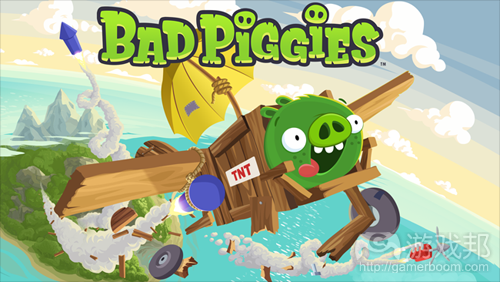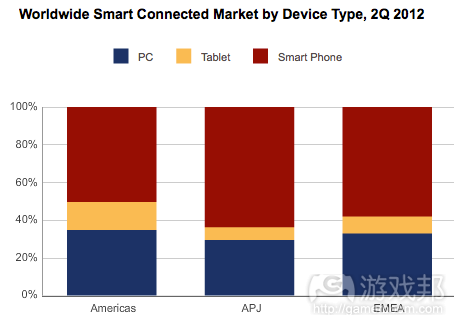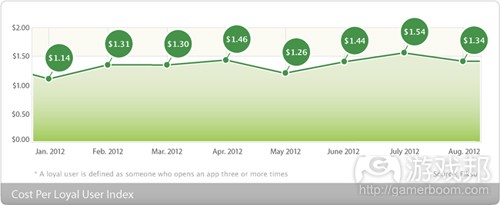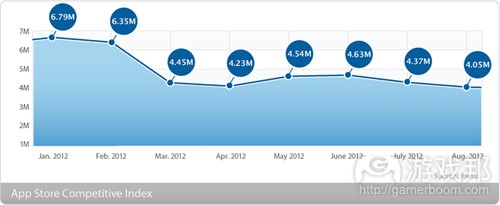每日观察:关注Rovio新游戏《Bad Piggies》(9.28)
1)据insidemobileapps报道,Rovio新游戏《Bad Piggies》日前发布即登上37个国家/地区的iPhone付费应用榜首,并称冠39个国家的付费iPad应用榜单(游戏邦注:包括澳大利亚、加拿大、台湾、法国、瑞典、西班牙、挪威和俄罗斯等国家/地区)。
该游戏位居40个国家/地区的付费iPhone应用前10名,并跻身另外36个国家/地区的付费iPad应用前10名(包括中国、墨西哥、英国、印度、日本和韩国等)。
值得注意的是,该游戏仅在9个国家/地区(包括美国、白俄罗斯、芬兰、匈牙利、捷克共和国、爱沙尼亚、希腊、马其顿和波兰)的热销iPhone、iPad应用榜单排名第一。
该游戏iPhone版本售价0.99美元,iPad版本售价2.99美元,目前其获成就并不如之前的《愤怒的小鸟太空版》和《Amazing Alex》这两款Rovio游戏。
《Bad Piggies》目前尚未出现在美国Google Play榜单,因为该平台榜单排名算法刷新比苹果更慢。其Android版本采用广告赞助的免费模式,推出了一个标准版和一个针对平板电脑的HD版本,并向亚马逊Appstore推出2.99美元版本,以及一个4.99美元的Mac App Store版本。
但目前还无法判断《Bad Piggies》能否长期领先,据AppData数据显示,Rovio上一款游戏《Amazing Alex》的iPhone版本目前仅位居美国付费应用榜单第107名,热销游戏榜单第368名。其HD版本付费iPad付费应用榜单第117名,iPad游戏榜单第226名。
2)IDC最新报告指出,2012年第二季度全球连网设备(包括智能手机、平板电脑、PC)市场规模同比去年增长27.4%,同比上季度增长2.8%。该市场总收益为1315亿美元,比去年增长16.3%,但比上季度下降2.7%。
但在美国该市场设备出货量及收益均明显下降,第二季度出货量不足4740万台,同比上季度下降7.8%,比去年下降5%;收益也降至248亿美元,同比上季度下降10.3%,比去年下滑8.6%。IDC称这一结果与经济形势和市场饱和度有关。
不过IDC预计2012年全球连网设备出货量仍将接近12亿台,同比去年增长27.4%;到2013年这一数据将增长至14亿台,同比增长19.2%;到2016年这一出货量将达20亿台,其中亚太地区将以8.6亿部设备出货量居于领先地位,届时美国出货量将占6亿部,而EMEA地区则是5.3亿部。
智能手机目前已占所有连网设备出货量的59%,年均增幅将达15.8%,预计到2016年其所占比例将近63%。平板电脑则将蚕食PC市场份额,其所占比例将从2012年的10%增长至2016年的13%,PC同一时期市场份额将从31%降至24%。
3)Fiksu最新报告指出,8月份iOS忠实用户(至少开启应用三次)获取成本下降了近13%,从7月份的1.54美元降至1.34美元。Fiksu指出这一现象与广告商借9月份的iPhone 5和iOS 6问世而加大广告投入力度有关。
有趣的是,广告商围绕去年10月份发布的iPhone 4S所制作的营销计划却出现了相反的效果,2011年9月iOS用户获取成本攀升至1.64美元。
从应用下载量来看,今年8月份免费应用日均下载量为405万次,降低了7.3%;而2011年9月份前200名免费iPhone应用日均下载量则是380万次,降幅为6%。
4)据Techcrunch报道,俄罗斯手机游戏工作室ZeptoLab日前与汉堡王签约合作,将于明年3月推出6款基于《割绳子》的儿童套餐附送玩具,ZeptoLab将依此制作一款含6个关卡的新游戏。但该公司并未透露具体合作条款,仅表示这是一个“营销”合作,因此有观察者推测这一项目可能并未涉及授权合作费用,而只是一次单纯的推广合作。
ZeptoLab目前在iOS、Android和Mac平台下载量已超过2.5亿次,目前有35-40名员工,是最早在iOS平台获得广泛品牌知名度及大量用户基础的手机应用开发商之一,其他也进军周边产品领域的开发商还包括芬兰的
Rovio、斯洛文尼亚的Outfit7以及澳大利亚的Halfbrick。值得注意的是,这些工作室无一来自美国,并且基本上采用自主筹资形式,甚至少接受风险投资,即使是Rovio也只在去年融资4200万,仅向投资者出让15%的股份。
5)据Techcrunch报道,手机应用营销平台Trademob首席执行官Ravi Kamran最近指出,苹果iOS 6的UDID替代品Advertising Identifier并不可行,因为通过Wi-Fi升级至iOS 6的用户ID显示都是0,只有将设备接入iTunes或Xcode升级至iOS 6的用户独立数字序列可正常显示。
iOS平台的广告营销是一个大问题,如果广告商无从观察广告针对单个用户的成效,那么他们就无法针对用户推出能够促进转化率或销售的广告内容。
6)Online Schools最近发布信息图表显示,74%的学校管理人员表示产数字内容有助于提高学生注意力,并有半数受访者称这些内容有助于发挥因才施教的作用。开发者应借此机会面向少儿用户推出有趣的内容。
在美国2-17岁学生群体中,每10个中就有9人玩过电子游戏。苏格兰的一项调查研究结果指出,有19所学校发现基于游戏的学习方式更能提高学生注意力。老师们发现玩游戏式的教学方法有助于提高孩子解决问题、沟通、合作和协调等团队能力。
最近对苹果App store教育类应用的分析显示,有80%的热销付费教育应用瞄准儿童群体;在2009至2011年,锁定学前教育及小学年龄层群体的应用比例已从47%增长至72%;锁定幼儿及学前年龄层的应用在教育类应用中所占收益达58%。
目前最热销教育类应用是《Curious George at the Zoo》,它在App Store发布首天下载量超过50万次,主要用途是教孩子如何照顾小动物。
在政府针对年轻群体的问卷调查中,有52%以上受访者曾玩过教育类电子游戏,70%认为玩电子游戏对孩子有好处。
(本文为游戏邦/gamerboom.com编译,拒绝任何不保留版权的转载,如需转载请联系:游戏邦)
1)Bad Piggies hits No. 1 in more than 37 countries — impressive, but not as good Angry Birds Space or Amazing Alex
Kathleen De Vere
Maybe people just don’t like those green pigs after all. Bad Piggies, the Angry Birds spin-off repaints the iconic hogs as heros doesn’t seem to be seeing the same launch day success that Angry Birds Space and Amazing Alex did.
The game was released today at 3:00 am pacific standard time, or 1:00 pm in the afternoon Helsinki time. When Inside Mobile Apps checked the iTunes app store this morning the game was the No. 1 paid iPhone app in 37 countries and the No. 1 paid iPad app in 39, including: Australia, New Zealand, Canada, Taiwan, France, Sweden, Spain, Norway and Russia.
The game is in the top 10 of the paid iPhone app charts in 40 countries, and in the top 10 of the paid iPad app charts in a further 36 including: China, Mexico, the U.K, India, the U.K., Japan and South Korea.
Interestingly, the game was the top grossing iPhone or iPad app just 9 countries when we checked: the U.S., Belarus, Finland, Hungary, Czech Republic, Estonia, Greece, Macedonia and Poland.
The game, which costs $0.99 on the iPhone and $2.99 on the iPad hasn’t seen the same chart reception as either Angry Birds Space or Amazing Alex, Rovio’s last two releases.
The highly anticipated (and heavily promoted) Angry Birds Space was an instant hit, shooting into the No. 1 spot on both the top grossing and top paid charts in dozens of countries including key markets like Germany, France, the U.K., the U.S. and China. Amazing Alex was also able to put in a strong debut on the paid app charts, hitting No. 1 in 53 countries on the iPhone and 68 on the iPad, although it wasn’t able to crack the top grossing app charts in key markets such as Japan, China or the U.S.
As is typical, the app hasn’t yet shown up on the U.S. Google Play charts, as Google’s chart ranking algorithm tends to update slower than the one Apple uses. The game is free on Android and monetizes via ads, and comes in both a standard and an HD version designed for tablets. The game is also available as a $2.99 Kindle in the Amazon Appstore, and as a $4.99 download in the Mac App Store.
It would be disingenuous to say the game isn’t a hit considering how many charts Bad Piggies is currently on top of, but it’s likely Rovio were hoping for a better debut for the title.
The company’s last game, Amazing Alex started strongly, but hasn’t been able to hold its momentum. According to our traffic tracking service AppData, the iPhone version of the game is currently the No. 107 top paid app and the No. 368 top grossing game in the U.S. The HD version is the No. 117 top paid iPad app and the No. 226 iPad app in the games genre. For Bad Piggies to see the same kind of success its Angry Bird precursors have, it will need to hold the momentum its built up today. We’ll be watching the title’s performance closely.(source:insidemobileapps)
2)IDC: Smart Device Shipments To Grow 14% Annually To 1.2B In 2016, But U.S. Shipments, Revenue Dropped In Q2
Sarah Perez
Evidence of market saturation in the U.S. can be seen in new research from IDC that takes a look at the global connected device market. Shipments and revenues declined here, even as worldwide market share grew. The connected device market, meaning smartphones, tablets, and PCs combined, grew 27.4% year-over-year in Q2 2012, IDC says. There was also a slight bump of 2.8% growth from Q1 to Q2. However, although total revenue was at $131.5 billion worldwide – 16.3% higher than the previous year – there was a 2.7% decline in revenue quarter-over-quarter.
In the U.S., the drops were significant, in terms of both shipments and revenue. Unit shipments for Q2 2012 fell 7.8% from last quarter, and were down 5% from the past year to just under 47.4 million units. Revenues dropped to $24.8 billion, a 10.3% decline from the previous quarter, and a 8.6% drop year-over-year. IDC says these numbers are a result of both the economy and, to some extent, the impact of market saturation.
The U.S. aside, IDC is still forecasting continued growth in the space, with worldwide total unit shipments for connected devices reaching nearly 1.2 billion in 2012, a 27.4% increase over 2011. The analysts believe that by 2013, that number will grow to 1.4 billion, a 19.2% year-over-year increase. By 2016, there will be 2 billion connected devices, with the Asia/Pacific region leading with over 860 million units. The Americas are forecast to have 600 million by 2016 and the EMEA region, 530 million.
Smartphones in particular, now accounting for 59% of connected device shipments, will grow 15.8% annually, to reach nearly 63% of shipments by 2016. Tablets will grow the fastest, though, rising from a 10% share in 2012 to 13% by 2016, eating into PC share, which will drop from 31% to 24% during the same time. In the EMEA region, IDC says tablets will gain share, while in the Americas and Asia/Pacific regions, volume will increase, but share will be smaller than the global total during this forecast period.(source:techcrunch)
3)Fiksu: anticipation for iPhone 5 depressed downloads, user acquisition costs in August
Kathleen De Vere
Rumors, leaks and hype surrounding the iPhone 5 seemed to be inescapable in August, and the pre-launch anticipation caused both iOS downloads and user acquisition costs plunge during the month according to Fisku.
The Boston-based company reported the cost to acquire a loyal user — defined as someone who will open an app at least three times — fell by almost 13 percent in August, dropping from $1.54 in July to $1.34 in August.
Fiksu CEO Micah Adler likened August’s plunge to the calm that comes before a storm, explaining that many advertisers ratcheted back their marketing spend during August in order to devote more resources to the iPhone 5 and iOS 6 launches in September.
Interestingly, marketer plans surrounding the iPhone 5 launch were almost opposite to those used for the Oct. 2011 launch of the iPhone 4S. In Sept. 2011 user acquisition costs climbed to $1.64 per loyal user — what was then a record high in anticipation of the 4S’ release.
Unlike marketers, Fiksu found that consumers exhibited similar behavior before the launches of both the iPhone 4S and the iPhone 5. The company reported free app downloads fell by 7.3 percent to 4.05 million daily downloads in August. By comparison in September 2011 download volume of the top 200 free iPhone apps fell by six percent to 3.8 million daily downloads.(source:insidemobileapps)
4)Cut The Rope-Maker ZeptoLab Score A Deal To Come To Kids’ Meals Near You
Kim-Mai Cutler
In another sign that mobile games are challenging or usurping other mediums like cartoons for creating powerful childrens’ brands, Russia’s ZeptoLab just signed a deal with Burger King to bring their Om Nom character from Cut The Rope into kids’ meals next March.
Cut The Rope will have six toys in kids’ meals next year. For its part, ZeptoLab is creating a new game with six levels that goes along with the toys. The company isn’t sharing terms of the deal except to say that it’s a “marketing” partnership, which probably means that there is no licensing revenue. It’s likely to be a pure promotional agreement.
“It’s reciprocal marketing,” said Tanya Haider, who came to ZeptoLab after serving as Nickelodeon’s senior vice president overseeing Spongebob Squarepants. “We will drive our users to their stores because we have this massive audience base here in the U.S.” ZeptoLab has seen more than 250 million downloads globally across iOS, Android and MacOS.
The company is one of a handful of early mobile developers that quickly amassed brand recognition and a sizable audience on the iOS platform. ZeptoLab, along with Slovenia’s Outfit7, Australia’s Halfbrick and the biggest one of them all, Finland’s Rovio, have moved into merchandising over the past year.
What’s interesting about all of them is that none are American and are all either bootstrapped or minimally diluted by venture funding. Even Rovio, which raised $42 million last year, only gave up 15 percent of the company to venture investors.
ZeptoLab is wholly bootstrapped and has 35 to 40 employees. These companies are lean, they control their own destinies and they have massive global reach thanks to the iOS and Android platforms. With both platforms having seen about 900 million device activations or cumulative device sales, smartphones are becoming increasingly competitive to other mediums like television.
ZeptoLab isn’t disclosing revenues or the share that comes from merchandising.
“We’re in the very early stages of a merchandising roll-out and we’re looking to grow that quite significantly,” Haider said. The company only announced its first wave of merchandising back in June with an agreement to release toys, games, apparel, accessories, confectionery, home decor and stationery. They closed a deal with Hasbro to release co-branded board games.
They’re trying to take a slightly different approach from Rovio, which is basically ubiquitous here and in China with the Angry Birds brand. “Our goal is to not oversaturate the market,” Haider said. “We’ve been really careful.”(source:techcrunch)
5)Source: Apple’s UDID Replacement For Advertisers In iOS 6 Is Broken
Darrell Etherington
Apple’s UDID replacement for iOS 6, a more private and tool dubbed the Apple Advertising Identifier that users can opt out of, isn’t working according to mobile app marketing platform Trademob. I spoke with Trademob CEO Ravi Kamran, who explained that any iOS 6 users who updated over Wi-Fi are showing IDs that are all zeros, instead of the unique number sequences being sent by those who plugged their devices in and updated via iTunes or Xcode.
Here’s the problem with that: Advertising on iOS is big business, and part of that big business involves being able to monitor the success of campaigns at the level of the individual user, in order to be able to provide ad content more likely to trigger a conversion or sale for that particular person. Without some way of knowing what kind of individual you’re serving ads to, the whole thing becomes a lot less likely to work in any meaningful way.
“The identifier is something that everybody was waiting for, and many were happy that it finally came,” Kamran said. “Many of the networks that we work with have already introduced a new SDK that takes the identifier from the publishers, so that it’s transmitted to the advertisers, and it’s actually very important that that work for the sake of the industry overall.”
According to Kamran, most advertisers were eagerly awaiting the new replacement of the UDID, which he says is overall much better in terms of protecting user privacy, since it’s non-personal and non-permanent in nature. The UDID came under fire after it caused some privacy problems with apps including Path. It also offers users the ability to turn it off complete, through an option in the General > About > Advertising section of the Settings app. I asked whether it might be the case that users simply had switched off the option, and if that might account for what Trademob was seeing, but Kamran said they’ve run extensive checks and compared notes with partners to make sure the actual cause of the problem was updating over Wi-Fi. It also doesn’t seem to matter where in the world users are; anyone updating via wireless network is sending unusable data.
It’s unclear what the percentage is of users that upgrade over-the-air versus via physical connection, but much higher early adoption rates than when iOS updates still required users to plug in suggest it could be a considerable amount. Users may not care (and in fact some might welcome the problem), but the iOS advertising ecosystem is bound to feel the pain until a fix is on the way.
We’ve contacted Apple to see whether a fix is in the works, and will update with more info when we hear back.(source:techcrunch)
6)INFOGRAPHIC: Can electronic games help kids to learn?
by Zen Terrelonge
INFOGRAPHIC: Can electronic games help kids to learn?
74 per cent of school administrators say digital content enhances student engagement.
Teachers have started using various tech in the classroom beyond traditional PCs and projectors, making use of games, social media, and QR codes to teach their students.
Indeed, the Online Schools infographic observes the trend and finds that 74 per cent of school admins say digital content increases engagements, and half say it helps personalise instructions.
What’s more, kids are becoming ever more tech-savvy which makes electronic devices user-friendly by default.
Meanwhile, mobile education is a rising space, with developers focusing apps towards children to make learning fun.(source:mobile-ent)














































 闽公网安备35020302001549号
闽公网安备35020302001549号